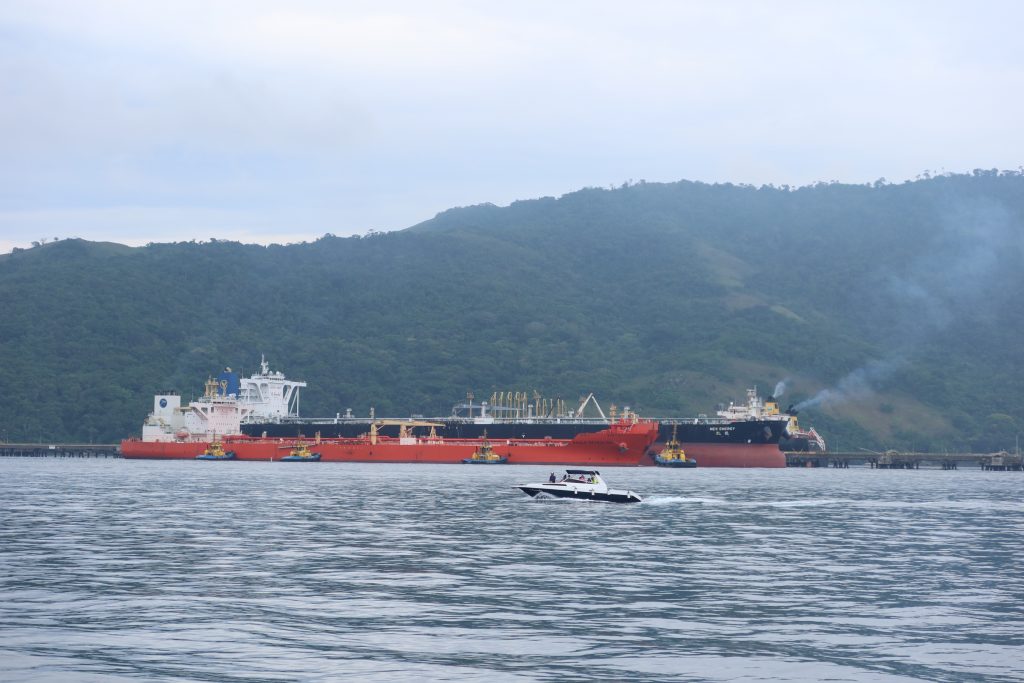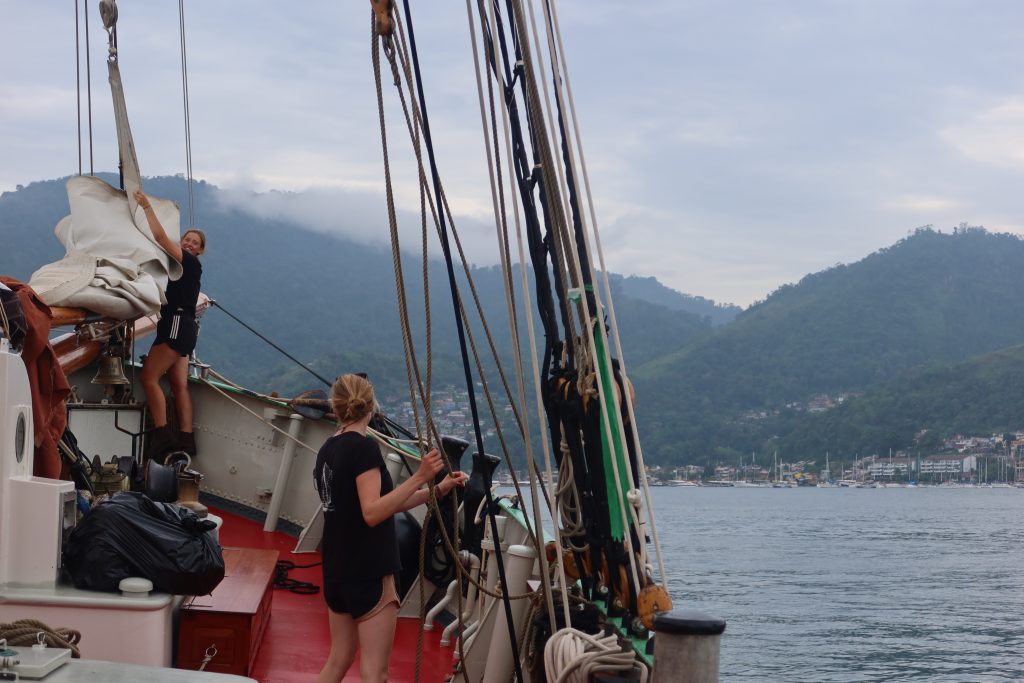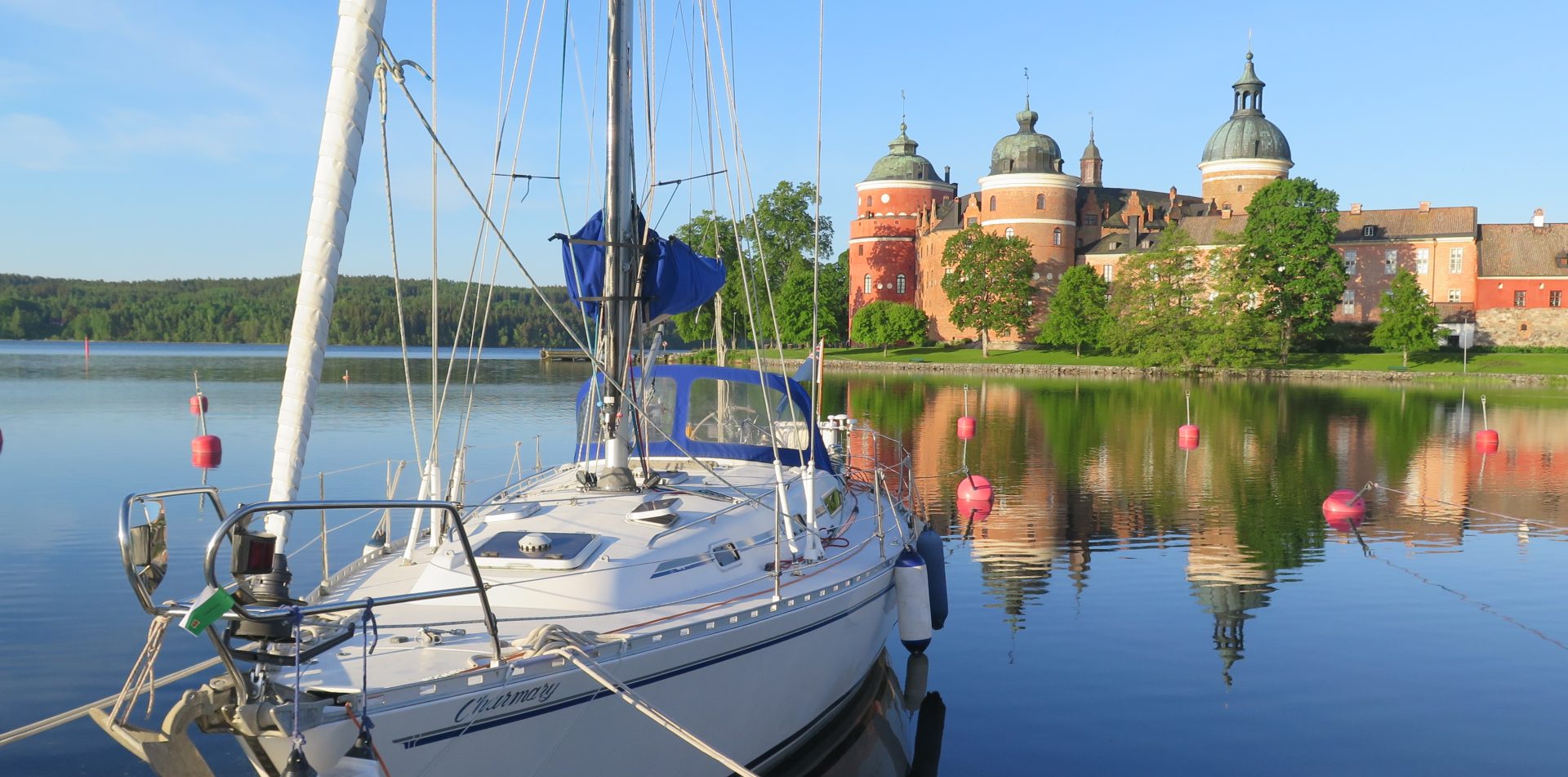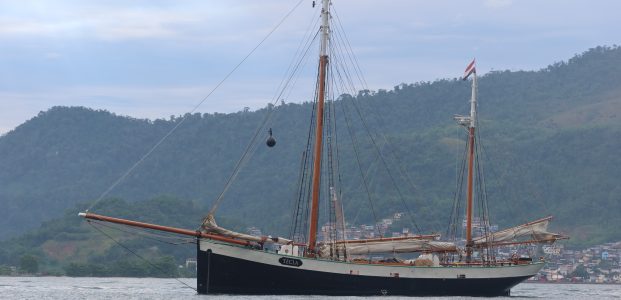Reading: Twenty Thousand Leagues Under the Sea (Jules Verne)
Weather: Wind light and variable. General weather – meltingly humid …..
Thought for the day: Are there any natural resources left to exploit in Brazil?
Evening meal: Frango parmigiana (chicken with a layer of processed ham and cheese on top!) with chips, beans and salad
Distance covered: Just over 20 miles
Wildlife headcount: Loads of frigate birds and smaller fancy coloured birds ashore ….
I got up a bit before 7am (10am UTC – we are three hours behind UTC) and headed up on deck to have a look round. There is always a huge sense of anticipation when you anchor somewhere new in the dark. In the morning it is like the curtain is lifted and all the vague outlines you saw as you came in take on distinct form and reveal themselves. In this case, the reveal was quite special – steep wooded hillsides surrounding us on three sides with a few smaller yachts anchored close in to a couple of beaches in front of us. Dotted around on the beaches and in the trees were a few houses nestled into their surroundings making them almost look like they belonged.

After a breakfast all together (an almost unique event), we raised the anchor shortly before 8am and motored slowly round to Angra dos Reis. It was a trip of around 20 miles, but even that short distance gave us a clear insight into the economics of Brazil and the socioeconomic and environmental challenges they face. Ilha Grande, the island where we had anchored, is clearly a playground for the rich. There was a hierarchy of visitors and their position in society was clearly evident from the way they travelled there. Starting somewhere towards the bottom of socioeconomic groups (though probably not that close to the bottom given the extreme poverty in the country) you travelled by ferry. These ferries had the look of Somalian fishing boats – the kind where you expect skiffs to be launched at any moment with knife-wielding pirates on board. Next up the ladder were small fibreglass motor boats, crammed to the gunwhales with groups of people with bundles of lifejackets strapped to the bimini and huge bundles of swimming noodles propped in the cockpit! As we moved further up in status we got to the private motor boats – Sunseekers of equivalent, but those at the very top of the pile marked themselves out clearly by travelling by helicopter! A maritime (and aviation) illustration of the extreme income inequality in Brazil.
As we headed around the north of the island, the scenery was beautiful – wooded hills and small islands with palm trees and beaches. However, these were all best viewed through a selective frame – perhaps a camera lens or similar as if you looked more widely the landscape was scarred by industrial activity. A huge long jetty was loading around four ships with what we presumed was oil. This jetty was so busy that five tugs were busy helping another tanker into its berth – rafting it up against one already there. The first time I have ever seen tankers rafting up and perhaps an interesting illustration of health and safety at work here! Elsewhere were huge survey ships with exploratory rigs built into them – clearly looking for new oil fields to exploit in amongst the islands.

We then came round the corner into the bay of Angra dos Reis looking carefully around to try and match the Google maps satellite images we had been sent by a local contact to the chart – not as easy as it sounds like it should be given the very different priorities of the two systems. However, we managed and dropped anchor just beyond the outer row of moorings. We were quickly visited by the local contact welcoming us but letting us know that we had arrived on a local holiday – a two day national holiday, making checking in even more challenging that it would normally be.
It transpired that we are guests of the local yacht club and they provide a 24/7 launch (well dinghy) service to take us ashore – we just radio VaVa on the VHF and within a couple of minutes – VaVa Voom – he appears! Because of the holiday we were told that we could just email photos of our passports to the local police and then perhaps deal with the full formalities on Wednesday when normal life resumes. So we headed ashore for a welcome beer with the locals who knew the Tecla and were members of the club. The facilities are great – an outdoor kitchen and BBQ area, swimming pool, showers and changing rooms and a bar and small café/restaurant. All at our disposal for the period of our stay. The club is clearly quite exclusive and just reinforced earlier impressions. Even coming ashore we are checked through a security gate and have to check in at the office. The whole club is fenced off and gated and the membership is clearly quite exclusive. The local Police Commissioner is apparently one of the Flag Officers! However, it was very nice and we sat having a beer for an hour or so and then the rest of the crew were taken off to the local shopping centre the other side of the bay to get SIM cards and some fresh fruit and other supplies. I stayed and tested their WiFi by calling home – it worked well and was lovely to catch up on things.

For the evening we ate ashore, using Google Translate to photograph the menu and translate what was there. Some of it perhaps was lost in translation, but a very nice evening. It seemed rude not to try the local drinks as well, so we had Caipirinhas. This is apparently Brazil’s national cocktail. I wasn’t quite sure what was in it, but after a couple of them you don’t care anyway. There was certainly lime juice involved, almost certainly sugar and a bit of salt and definitely alcohol of some sort – the kind that kicks back as you drink it …. very nice. Subsequent research (Wikipedia!) tells me that the alcohol is Cachaça – alcohol made from fermented sugar cane juice. When the Portugese switched sugar production from Madeira to Brazil in the 16th century they brought the stills to make it from Madeira and the rest, as they say, is history. It feels like the sort of alcohol you drink to forget history and in the light of the history of sugar, this may be wise.
All in all a slightly surreal welcome back to land after a month at sea!


